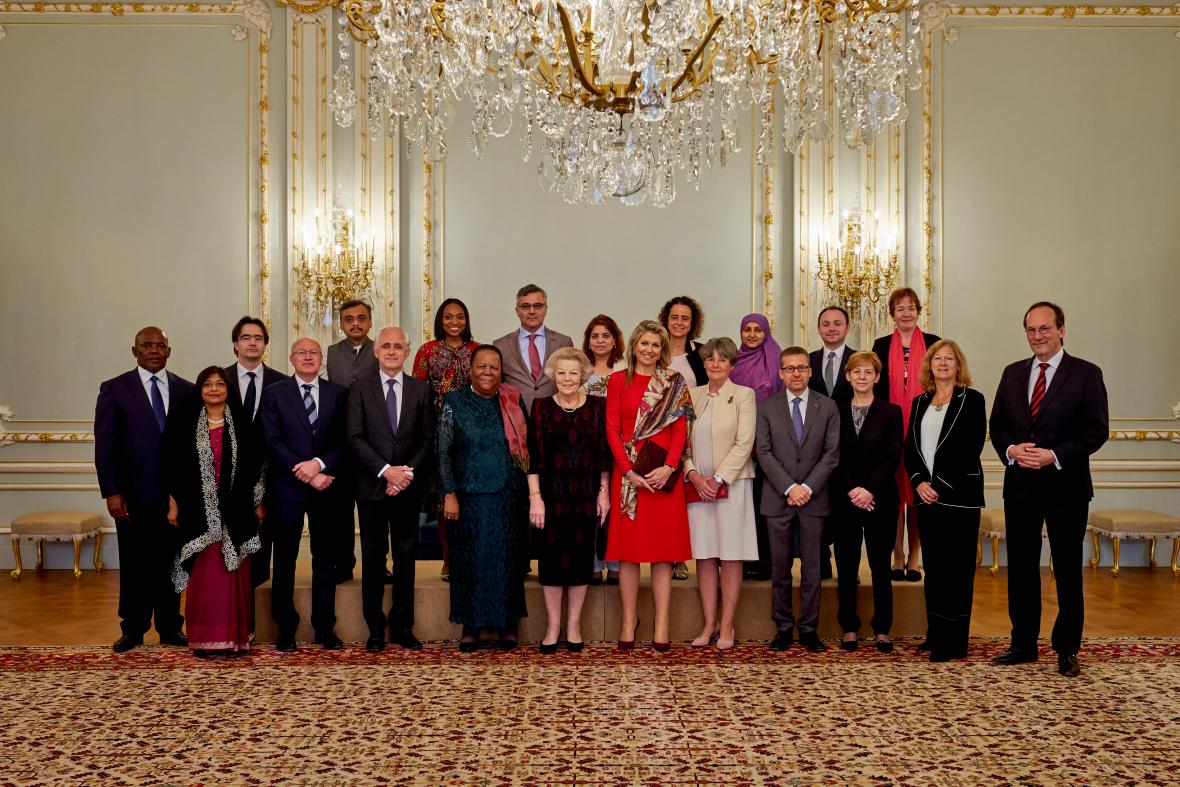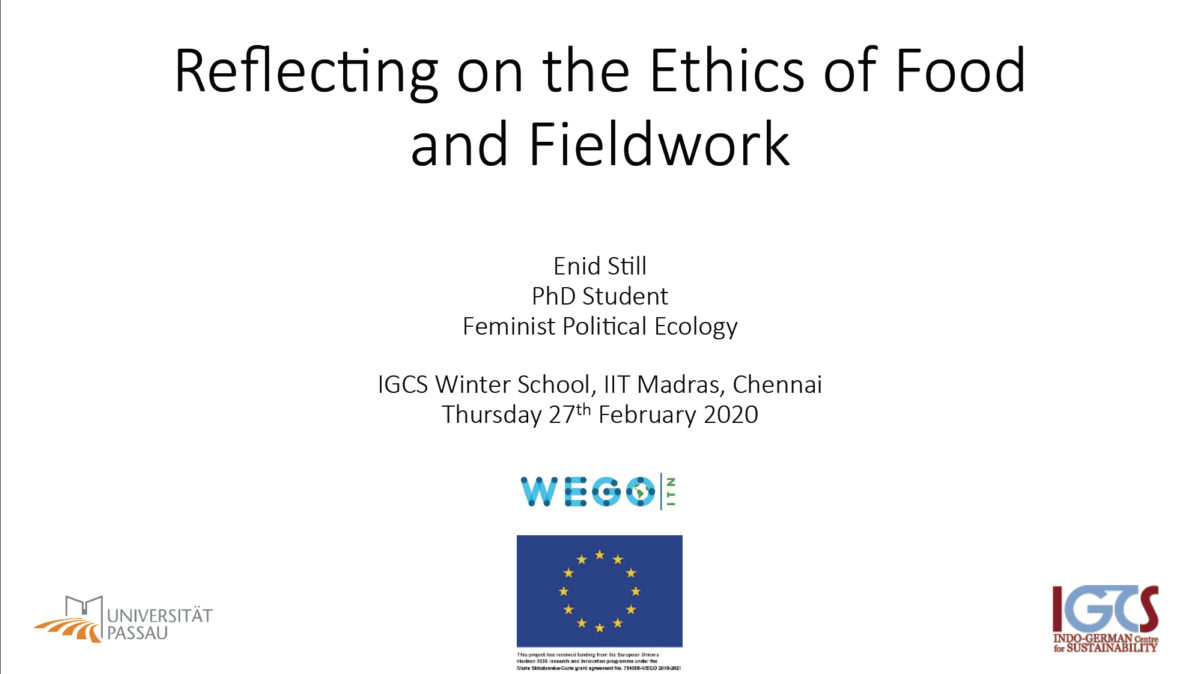WEGO is happy to announce that our proposals for two ‘Paper Session’ entitled ‘Ecologies of Care I – Politics and ethics of care’ and Ecologies of Care II – Care-full political ecology – with whom, with what and where do we care?’ has been accepted for inclusion in the POLLEN 20 conference.
The Third Biennial Conference of the Political Ecology Network (POLLEN 20) will take place from 24 – 26 June 2020 in Brighton, UK.
The conference theme is Contested Natures: Power, Possibility, Prefiguration
Organiser Name and Contacts:
Wendy Harcourt: harcourt@iss.nl; Enid Still: Enid.Still@uni-passau.de; Jaime Landinez Aceros: jlandinez@stanford.edu and Constance Dupuis: dupuis@iss.nl
Title: Ecologies of Care
Key words: care, gender, feminism, more-than-human, ethics
Session abstract
Recent debates on the politics and ethics of care brings together the politics of gendered bodies and labour, the messy ethics of more-than-human interdependencies, and questions of difference and belonging in alternative ways of being-in-the-world (Harcourt 2017; Puig de la Bellacasa 2017; Singh 2017). These perspectives tease out the invisibility of ‘caring ethics’ and what care means and does in different contexts and different socio-natural entanglements, exploring how practices of care can animate, complicate or make visible such entanglements. These discussions are infused with hope for an alternative, more ecologically sane society but are also critical of the depoliticisation of care as inherently ‘good’ or naturalised. The non-innocence of care and its uneven nature within more-than-human interdependencies are therefore central to these debates (Puig de la Bellacasa 2017). This panel organised by Well-being, Ecology, Gender and cOmmunity – Innovative Training Network (WEGO-ITN) will try to build upon these discussions, expanding notions of care beyond human subjectivities (and yet rooting it in anthropocentric times), through exploring how care emerges in landscapes of extractivist ruins.
Core themes running through the panel will be: what caring practices are emerging from sites of socio-ecological transformation? How are notions and practices of care complicated by their non-innocence in particular sites and contexts? How are more-than-human interdependencies are animated when practices of care take place in extractivist ruins? The panel will look towards how we can repair our world as we seek to ‘interweave’ our bodies, ourselves and our socio-natures in a ‘complex, life-sustaining web’ (Tronto 2017) as we seek to locate some of the many ‘care-ful’ forms of political ecology needed to ‘reappropriate, reconstruct and reinvent our personal and political lifeworlds’ (Escobar and Harcourt 2005). The two panels will look at two main themes: Care in Extractivist Ruins and Care-ful political ecology – with whom, with what and where do we care?
References
- Escobar, Arturo and Wendy Harcourt 2005 “Introduction”, Women and the Politics of Place London: Zed Books. 1-19.
- Harcourt, Wendy. 2017. “Gender and Sustainable Livelihoods: Linking Gendered Experiences of Environment , Community and Self.” Agriculture and Human Values34(4):1007–19.
- Puig de la Bellacasa, Maria. 2017. Matters of Care: Speculative Ethics in More than Human Worlds. Minneapolis, Minn.: University of Minnesota Press.
- Singh, Neera. 2017. “Becoming a Commoner: The Commons as Sites for Affective Socio-Nature Encounters and Co- Becomings.” Ephemera: Theory & Politics in Organization 17(4):751–76.
- Tronto, Joan. 2017. “There is an alternative: homines curans and the limits of neoliberalism”. International Journal of Care and Caring 1: 27-43.
Part I: ‘Ecologies of Care I – Politics and ethics of care’
The first panel ‘Care in Extractivist Ruins’ will focus on how more-than-human interdependencies in sites of extraction are illuminated through practices of care and how such caring practices can become forms of resistance or coping. Some key questions the panel will address are:
- How can caring socio-natural entanglements resist, undercut, refuse logics of colonialism, militarization, and capitalism?
- When and how does extractivism extract, appropriate or exploit care (human, non-human) in local and global sites of climate crisis? e.g. through CSR campaigns that legitimise the extractive regime
- What practices of care emerge in the ruins of extractive landscapes in the global South and how do they contest assumptions around wellbeing?
Panel Participants
Each presentation will have 10 minutes this will be followed by buzz groups among the participants and a Q and A. The discussant taking into account the discussion 15 minutes before the end of the session will ask one question to each panelist who will respond.
Collective Care in Times of Agrarian Crisis by Enid Still (UK), Universität Passau, Germany
Abstract: The agrarian crisis in India has been depicted as one of indebtedness and financial burden, driving thousands of farmers to suicide. This picture is of course inherently partial. The experiences of women farmers and the widows of farmers who have committed suicide trouble the perception of suicides as only an economic ‘problem.’ They reveal a much deeper social malaise, rooted in a politics of land, patriarchy and caste, re-produced by regimes of exploitation and dependency, where the extraction of value from the soil and the extraction of bodies from agrarian communities are deeply intertwined. The perspective of women farmers and farm widows on the crisis have been silenced and invisibilised, their ability to navigate these times thus curtailed, due to both cultural norms that stigmatise widows in multi-layered ways and narrow socio-political categories that define farmers as landowners, predominantly therefore upper-caste men. Through practices of collective care however, the struggles of rural women in India are finding a voice and demonstrating the possibilities for healing degraded lands and a traumatised agrarian community.
Poisoned Landscapes: Stories of Soil Care Amidst War Times by Jaime Landinez-Aceros (Colombia), Stanford University, USA
Beyond Economy: Exploring Care within the Everyday Lives of Independent Oil Palm Smallholders in West Kalimantan, Indonesia by Dian Ekowati (Indonesia), Brighton University, UK
Siti Maimunah (Indonesia), Universität Passau, Germany
Facilitator and Discussant: Giovanna DiChiro, Swathmore College, USA, gdichir2@swarthmore.edu
Part II: ‘Ecologies of Care II – Care-full political ecology – with whom, with what and where do we care?’
The second panel on ‘Care-full political ecology – with whom, with what and where do we care?’ will explore from feminist, interdisciplinary and intergenerational perspective ‘care-full political ecology’ describing different acts of looking after, protecting and providing for the needs of human and non-human others. The papers will look at how care operates in the co-production of genders, natures and bodies as we move towards emancipatory politics of life-worlds.
Panel Participants
Each presentation will have 10 minutes this will be followed by buzz groups among the participants and a Q and A. The discussant taking into account the discussion 15 minutes before the end of the session will ask one question to each panellist who will respond.
Enfleshing Human Rights and the Inter-American Convention On Protecting The Human Rights Of Older Persons by Ana Agostino (Uruguay), Montevideo, Uruguay and Constance Dupuis (Canada), International Institute of Social Studies of Erasmus University Rotterdam, The Hague, The Netherlands
Caring for self and nature: Women and Ageing in Rural Japan by Nanako Nakamura (Japan) and Chizu Sato (Japan), University of Wageningen, The Netherlands
Abstract:
Flower farmers and water flows: caring for and theorizing about troubled socionatures in Maharashtra, India by Irene Leonardelli (Italy), IHE Delft Institute for Water Education, Delft, The Netherlands
Abstract: The paper will look at the everyday practices of care, reciprocity, sharing, solidarity and equity between farmers and natures among flower growers in Maharashtra. Inspired by feminist political ecology studies, I unpack the multiple socionatural relations, practices, experiences and embodied emotions of women farmers growing flowers using waste water coming from nearby industrial areas. By looking at flowers as a product of socionatural interaction (or women farmers-water interaction), I unfold the tensions farmers experience in the everyday in relation to taking care of themselves, of their community and of the nature they inhabit. I develop my narrative as a way to theorize about and care for more sustainable and equitable socio-natural presents (and futures).
Facilitator and Discussant: Yvonne Underhill-Sem, University of Auckland, New Zealand, y.underhill-sem@auckland.ac.nz
More information on the WEGO sessions will follow





